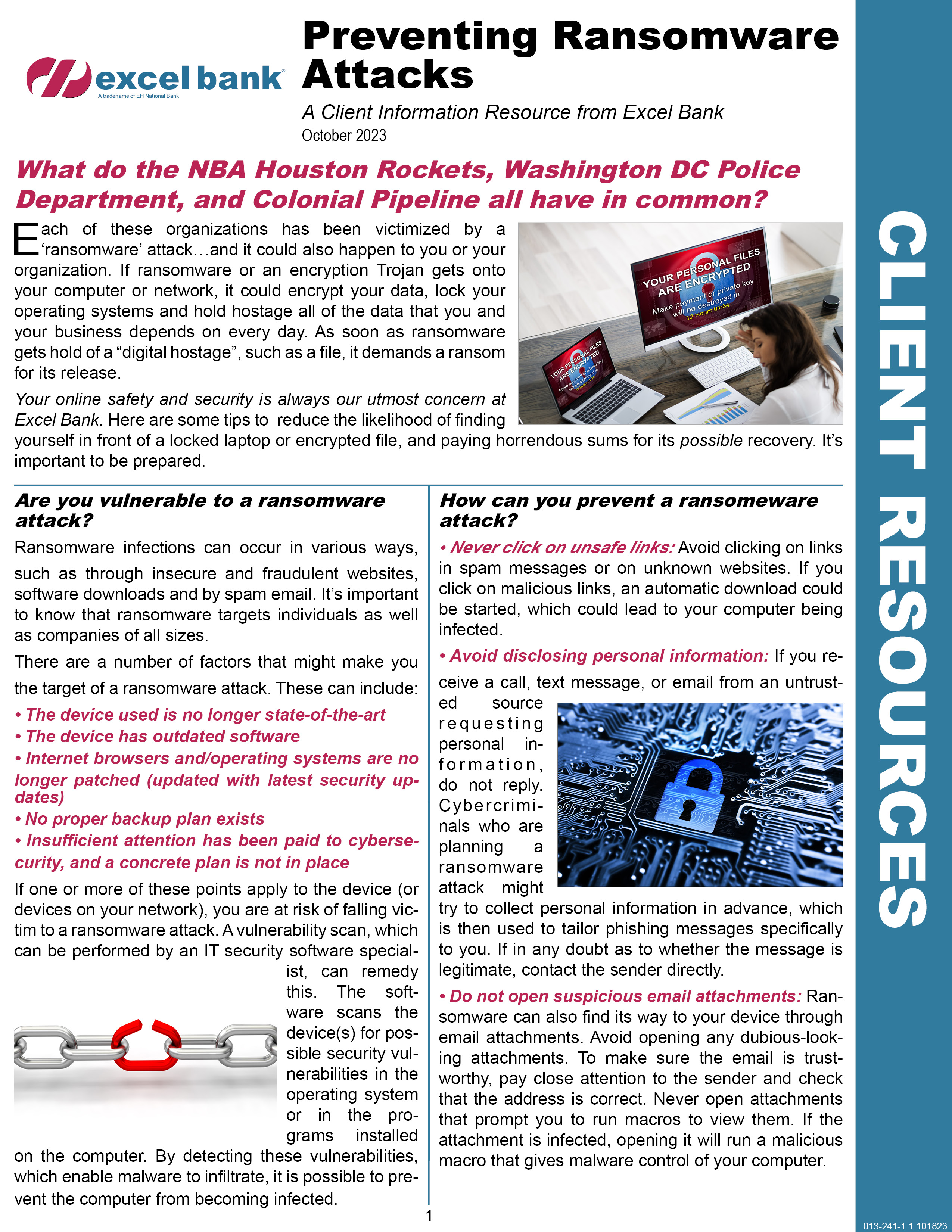

Excel Bank Cybersecurity Guide
Keep your computers and mobile devices up to date. Having the latest security software, web browser, and operating system are the best defenses against viruses, malware, and other online threats. Turn on automatic updates so you receive the newest fixes as they become available.
Install a personal firewall. Though most office networks include firewall protection, your home computer may benefit from this added level of security. Check to see if your operating system already includes a firewall prior to purchasing a separate one.
Install and update anti-virus software. Commercially available virus protection software helps reduce the risk of contracting computer viruses that can compromise your security. These programs offer continuous upgrades in response to the latest threats.
Activate a pop-up blocker. Several free, publicly available programs exist that will block all pop-up windows from occurring while you are online. Perform an Internet search for "pop-up blocker" or look at the options provided by major search engines. You should confirm that these programs are from legitimate companies before downloading. Once you have installed a pop-up blocker, you should determine if it blocks information that you need to view or access. If this is the case, you should consider turning off the blocker when you are on Web sites you know use pop-windows to provide information you need or want to view.
Scan your computer for spyware regularly. You can eliminate potentially risky pop-up windows by removing any spyware or adware installed on your computer. Spyware and adware are programs that look in on your Web viewing activity and potentially relay information to a disreputable source. Perform an Internet search for "spyware" or "adware" to find free spyware removal programs. You should confirm that these programs are from legitimate companies before downloading. As with a pop-up blocker, you will want to be sure that your removal program is not blocking, or removing, wanted items, and if it is, consider turning it off on some Web sites.
Watch out for phishing scams. Phishing scams use fraudulent emails and websites to trick users into disclosing private account or login information. Do not click on links or open any attachments or pop-up screens from sources you are not familiar with.
Shop safely. Before shopping online, make sure the website uses secure technology. When you are at the checkout screen, verify that the web address begins with https. Also, check to see if a tiny locked padlock symbol appears on the page.
Secure your internet connection. Always protect your home wireless network with a password. When connecting to public Wi-Fi networks, be cautious about what information you are sending over it. Consider using a Virtual Private Network (VPN) app to secure and encrypt your communications when connecting to a public Wi-Fi network. (See the Federal Trade Commission’s tips for selecting a VPN app.)
Recognize and avoid bogus website links. Cybercriminals embed malicious links to download malware onto devices and/or/ route users to bogus websites. Hover over suspicious links to view the actual URL that you are being routed to. Fraudulent links are often disguised by simple changes in the URL. For example: www.ABC-Bank.com vs ABC_Bank.com
Keep personal information personal. Hackers can use social media profiles to figure out your passwords and answer those security questions in the password reset tools. Lock down your privacy settings and avoid posting things like birthdays, addresses, mother’s maiden name, etc. Be wary of requests to connect from people you do not know.
Avoid downloading programs from unknown sources. Downloads from unfamiliar sources may contain hidden programs or viruses that can compromise your computer's security.
Avoid downloading programs from unknown sources. Downloads from unfamiliar sources may contain hidden programs or viruses that can compromise your computer's security.
Disconnect from the Internet when not in use. Dedicated services such as DSL or high-speed cable provide a constant connection between your computer and the Internet. When not in use, disconnect from the Internet to avoid unwanted access to the information on your computer. Even if you have a firewall installed, this is an additional step you can take to help protect yourself.

Become an EH Client


